Mechanization supports women farmers’ productivity, but impact on empowerment is inconclusive
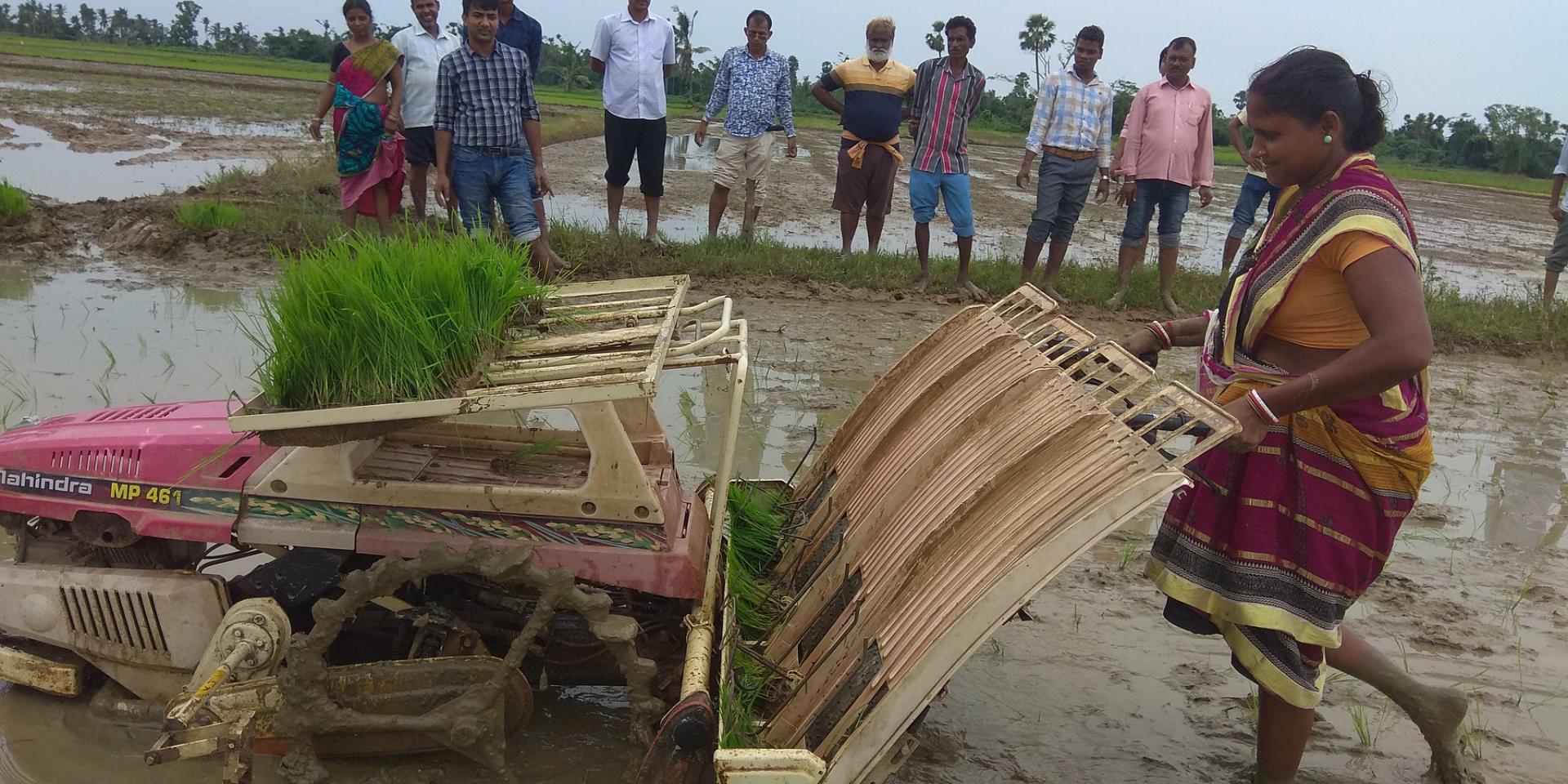 Photo: IRRI
Photo: IRRI
- Mechanization is regarded as a key tool in the empowerment of women in agriculture.
- Mechanization is often associated with an increase in farmers’ income and time available to invest in alternative economic activities.
- Evidence suggests a limited but positive impact of mechanization on women’s agricultural productivity.
- Evidence on the specific benefits of mechanization for women and its different impacts on women and men farmers remains inadequate.
Mechanization saves women’s labor and provides opportunities to boost income
Women represent much of the world’s agricultural labor force, but their productivity is constrained by their limited time, access to inputs, property rights and agricultural knowledge. Mechanization as a labor-saving technology is identified as a key tool in the empowerment of women in agriculture.
Available literature highlights that mechanization affects women and men differently, as most technology is designed for men by men, without considering the specific needs of women. Women are less likely to adopt newer technology due to difficulty accessing loans, savings, insurance, specialized education and skills; and existing gendered social and cultural norms.
When women farmers are able to adopt mechanization, they benefit from more income, more time, better health, and economic empowerment.
Evaluating the impact of mechanization on women’s empowerment
In a forthcoming systematic review, we reviewed both quantitative and qualitative studies to understand the impact of mechanization interventions on women’s empowerment.
The 62 studies reviewed were predominantly from lower-middle-income and low-income countries in sub-Saharan Africa and South Asia, represented in the majority by countries such as Ethiopia, Tanzania, Ghana, India and Nepal.
The review evaluated the impact of mechanization across various outcomes such as land use, labor use, income, yields, market access, autonomy in decision-making regarding income and resources, leadership positions in groups, health and nutrition, and other empowerment indicators. The review also assessed the effectiveness of interventions specifically designed to benefit women by increasing their productivity and empowerment, or reducing their drudgery. It also looked at the factors supporting and derailing gender-responsive mechanization interventions.
Mechanization has a small but positive effect on agricultural productivity
Mechanization led to a small but significant increase in yields, farm profits, cultivated area and reduced labor. However, evidence explaining the specific impacts on health and gender was scarce.
Outcomes of mechanization for women farmers
While evidence on the impact of mechanization on women’s empowerment remains limited, it provides important insights.
Mechanization had positive effects on women’s:
- ability to accumulate additional assets
- membership and contributions to groups and collectives
- availability of additional time
Mechanization also enables poorer women and widows, restricted by cultural norms in performing field work, to perform other income-generating activities in their saved time.
However, negative ramifications such as decreased soil fertility, deforestation, unemployment, and social norms that increase women’s workloads can disincentivize women from adopting mechanization.
Key factors facilitate or hinder women’s participation in agricultural mechanization
Factors that facilitated women’s participation in mechanization included:
- their level of independence regarding decision-making and control over resources
- the availability of subsidies
- the presence of women’s groups and collectives that promoted participation in agricultural mechanization
Factors that prevented women from taking advantage of mechanization interventions included:
- lack of awareness, knowledge and skills about new technologies
- absence of women training officers or experts
- sociocultural norms
- gendered division of labor
- affordability of machinery
Women were generally uninformed about mechanization and tended to be unequipped and untrained in using technology, as well as dependent on men to receive information on these developments.
Limitations of the evidence
The forthcoming review broadly, though moderately, supports the effectiveness of mechanization based on its ability to increase cultivated area, yields and profit. The impact on women’s empowerment remains inconclusive.
A lack of research focusing on women and the availability of gender-specific data in published studies makes it difficult to develop gender-specific policy recommendations for introducing agricultural mechanization interventions.
The analysis from this review was also limited by the generalized conclusions of the review. The reliance on studies mostly from sub-Saharan Africa and South Asia in this review indicates that future research would benefit from a wider contextual and geographical focus.
Policy recommendations
- Promote shared ownership of mechanization through women’s groups and collectives. For instance, collective purchasing of machines and operation of mechanized services includes women in decision-making and provides them access to agricultural information and technology.
- Improve women’s access to finance, improving their access to machinery.
- Provide capacity-building and training programs to increase women’s knowledge and skills in machinery and equipment use, and maintenance.
- Strengthen women’s collectives and groups to support their access to mechanization.
- Collect gender-specific data to inform targeted interventions and evidence-based policies, and programs for promoting mechanization.
- Design and promote mechanization practices that do not compromise soil fertility, reduce forest cover, and undermine land resources—thereby negatively affecting women.
Full Citation
Masset, Edoardo and Suchi Kapoor Malhotra. 2024. Mechanization supports women farmers’ productivity, but impact on empowerment is inclusive. Nairobi, Kenya: CGIAR GENDER Impact Platform.
References
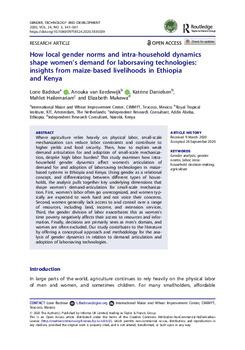
How local gender norms and intra-household dynamics shape women’s demand for laborsaving technologies: insights from maize-based livelihoods in Ethiopia and Kenya
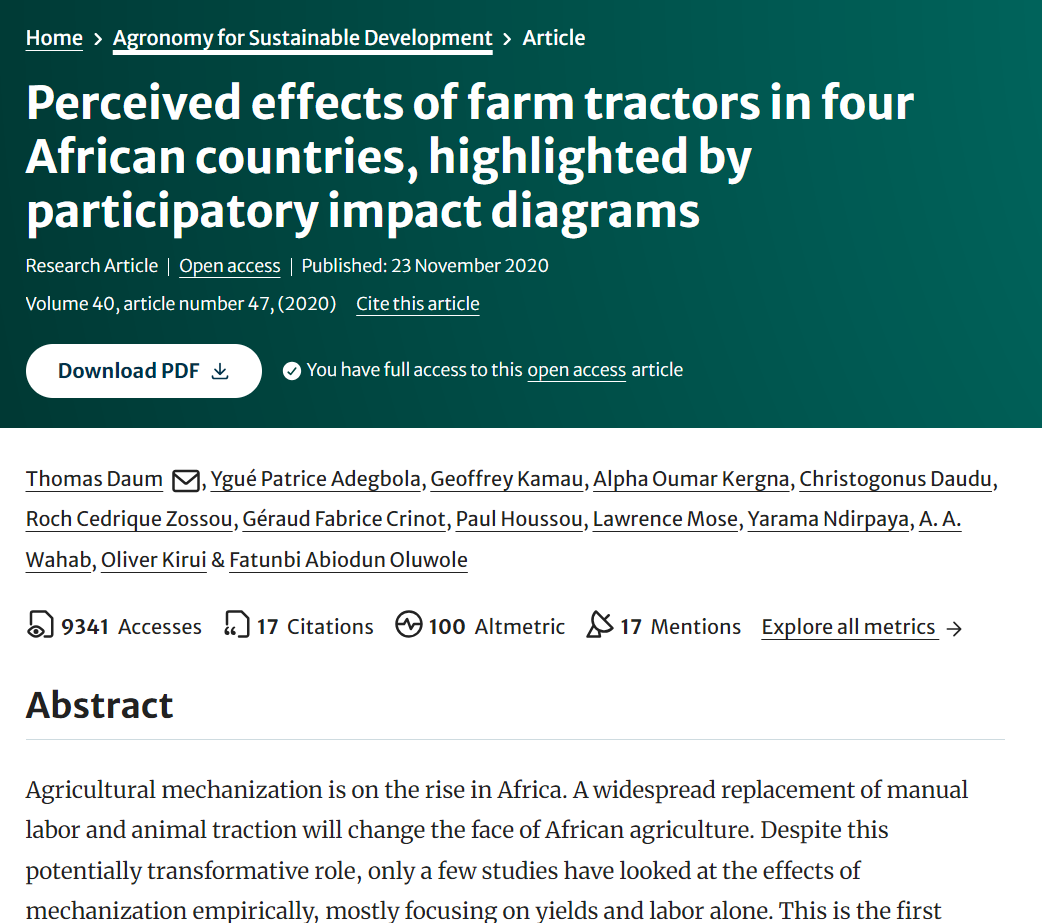
Perceived effects of farm tractors in four African countries, highlighted by participatory impact diagrams
Daum, Thomas, Ygué Patrice Adegbola, Geoffrey Kamau, Alpha Oumar Kergna, Christogonus Daudu, Roch Cedrique Zossou, Géraud Fabrice Crinot, et al. 2020. “Perceived Effects of Farm Tractors in Four African Countries, Highlighted by Participatory Impact Diagrams.” Agronomy for Sustainable Development 40 (6): 47. https://doi.org/10.1007/s13593-020-00651-2.
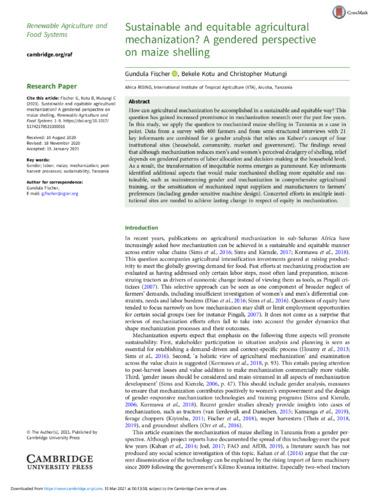
Sustainable and equitable agricultural mechanization? A gendered perspective on maize shelling
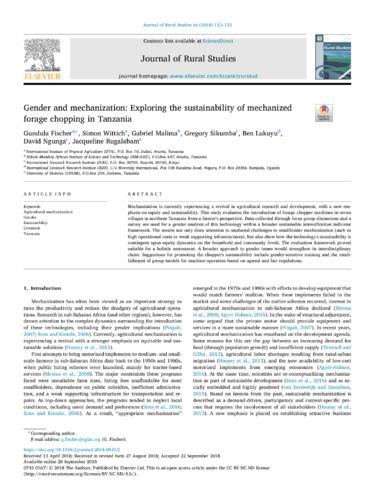
Gender and mechanization: exploring the sustainability of mechanized forage chopping in Tanzania
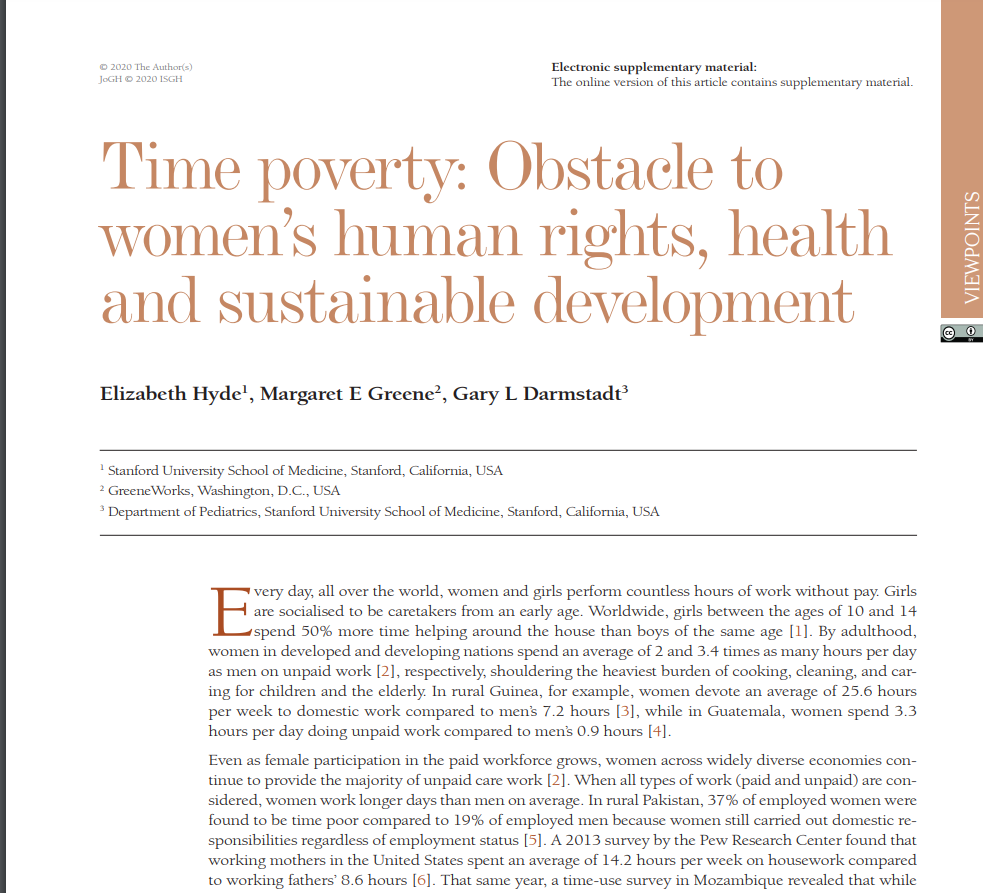
Time poverty: Obstacle to women’s human rights, health and sustainable development
Hyde, Elizabeth, Margaret E Greene, and Gary L Darmstadt. 2020. “Time Poverty: Obstacle to Women’s Human Rights, Health and Sustainable Development.” Journal of Global Health 10 (2): 020313. https://doi.org/10.7189/jogh.10.020313.
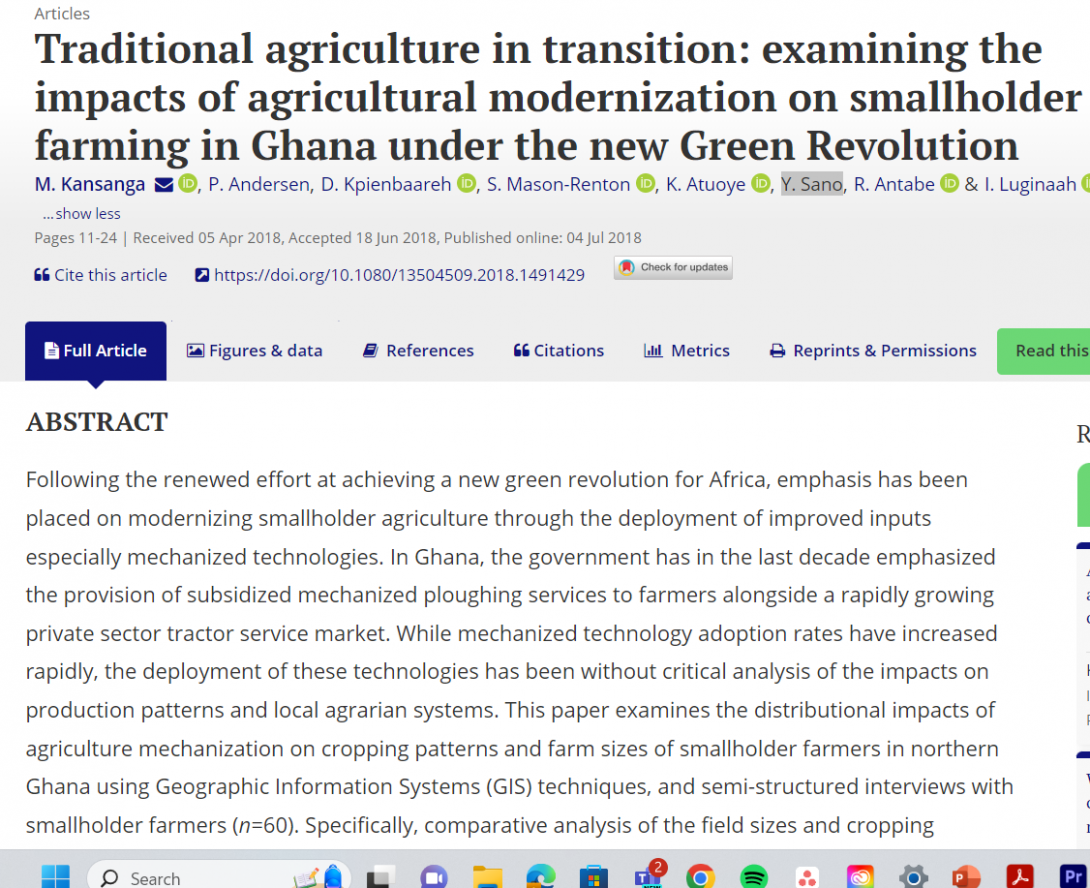
Traditional agriculture in transition: examining the impacts of agricultural modernization on smallholder farming in Ghana under the new Green Revolution
Kansanga, M., P. Andersen, D. Kpienbaareh, S. Mason-Renton, K. Atuoye, Y. Sano, R. Antabe, and I. Luginaah. 2019. “Traditional Agriculture in Transition: Examining the Impacts of Agricultural Modernization on Smallholder Farming in Ghana under the New Green Revolution.” International Journal of Sustainable Development & World Ecology 26 (1): 11–24. https://doi.org/10.1080/13504509.2018.1491429
Gender and institutional dimensions of agricultural technology adoption A review of literature and synthesis of 35 case studies
Overcoming gender gaps in rural mechanization: Lessons from reaper-harvester service provision in Bangladesh
A systematic review of labor-saving technologies: Implications for women in agriculture
Vemireddy, Vidya, and Anjali Choudhary. 2021. "A systematic review of labor-saving technologies: Implications for women in agriculture. " Global Food Security 29 (100541). https://doi.org/10.1016/j.gfs.2021.100541.